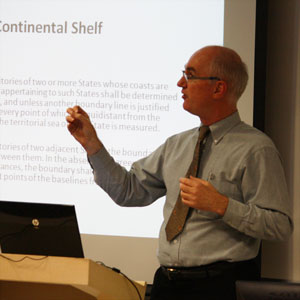Information
Venue
Start
End
Recent Developments in Maritime Boundary Delimitation Law

Introduction
The international law on maritime boundary delimitation, while having a foundation in multilateral treaties such as the 1982 UN Convention on the Law of the Sea, has been greatly influenced by the decisions of the International Court of Justice (ICJ) and arbitrations panels. There have been a handful of recent cases, most particularly the 2009 ICJ Black Sea Case (Romania v. Ukraine), which have solidified the law in a manner that would not have been predicted from the earlier cases. Maritime boundary delimitation law has revolved principally around the role of equidistance as a method of delimitation. Essentially, what has taken place over 50 years has been a circle with the legal framework set out in the Black Sea Case being much the same as that in the earliest multilateral convention from 1958. The question is whether this is a positive development, a negative development and whether the current legal framework will move yet again.
About the Speaker
Professor McDorman joined the Faculty of Law in 1985 and was promoted to Professor in 2001. His teaching areas include public international law, international trade law, international ocean and environmental law, and private international law (conflicts of law). He taught Canadian constitutional law for many years and has also taught Canadian environmental law and comparative Asian law. He has a cross-appointment with the Department of Geography and is an Associate of the Centre for Asia-Pacific Initiatives. Professor McDorman has been a visiting professor at institutions in Thailand, Sweden, the Netherlands and Canada. He has over 100 publications in the areas of ocean law and policy, international trade law and comparative constitutional law. Since 2000, he has been the editor-in-chief of Ocean Development and International Law: The Journal of Marine Affairs. He has undertaken a variety of projects for the Food and Agriculture Organization of the United Nations, including: the drafting of legislation, conducting workshops and report writing on fisheries and fisheries trade. He has also written reports for the governments of Canada, Quebec and British Columbia. From 2002 to 2004, Professor McDorman was Academic-in- Residence with the Bureau of Legal Affairs of the Department of Foreign Affairs and International Trade in Ottawa. In the spring of 2007, he was the Fulbright Visiting Chair in Canada-U.S. Relations at the Woodrow Wilson International Center for Scholars in Washington, D.C.


